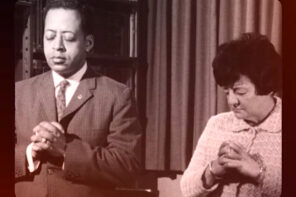Still looking for a fun and exciting summer activity? Have you thought about ghost hunting? I earned my PhD studying ghost hunters in the contemporary United States. Ghost hunters are people, often organized into groups, who use electronic devices and psychic abilities to investigate hauntings. You may have seen them on one of the many popular ghost hunting television shows like Ghost Hunters or Ghost Adventures.
When I returned to the town where I did most of my graduate work, I thought it was the perfect opportunity to reconnect with some of the ghost hunters with whom I had investigated. A couple of them told me summer is an extremely busy time with all the paranormal events they have booked. One team told me the summer is their busiest time, which surprised me given how busy the Halloween season is. Local ghost hunting teams invite the public on investigations of haunted places, often for a fee. Famously haunted locations, such as the St. Albans Sanatorium in Radford, VA or the Trans-Allegheny Lunatic Asylum in Weston, WV, host haunted tours and open their doors for ghost hunting teams and others to investigate the paranormal.
All of this is happening in the twenty-first century in one of the most industrialized and educated nations in the world. If you think this is odd, you’re not alone. Many Western intellectuals and scholars in the middle of the twentieth century expected supernatural belief and religion to decline as modernity rolled on. They were right on one level. Traditional religious affiliation has indeed been declining in the United States over the past couple decades. On the other hand, supernatural beliefs and some forms of spirituality don’t seem to be on the decline. For example, some sociologists suspect that paranormal belief, such as belief in ghosts, psychics, alien visitors, and creatures like Bigfoot, is on the rise in the United States. Furthermore, a group that is growing in the United States is those who claim to be “spiritual, but not religious.” Many people claim no religious affiliation, yet still believe in God and participate in religious activities such as prayer. It’s common for those who claim no religion to hold New Age beliefs, such as reincarnation and astrology.
One of the thinkers who did the most to establish the idea that belief in magic and the supernatural would decline as modernity advances was pioneering German sociologist Max Weber (1864-1920). He argued that the forces of modernity, such as industrialization, the advance of science, and overall rationalization would cause the supernatural to play less and less of a role in people’s lives and in the ways they think. The term he used for this process was the “disenchantment of the world.”
This analysis seemed correct to many later intellectuals and scholars, and it reached its height in the middle decades of the twentieth century. The question “Is God Dead?” famously appeared on the cover of Time magazine in 1966. The disenchantment thesis is often just thought of as common sense; it seems obvious to some of us that the advance of modernity and science will chase away supernatural ways of thinking. The only problem with this theory is that it just doesn’t appear to have happened. As the contemporary popularity of haunted attractions indicate, disenchantment simply hasn’t happened in the way that scholars once predicted.
And yet, not only was the disenchantment of the world at one time the scholarly consensus, but most scholars agreed this process was actually taking place. And we can see why: traditional religious affiliation and influence has declined. Enchantment, however, seems to persist. People often crave supernatural experiences. We often believe in spirits and other supernatural entities or forces whether or not we go to something like a church. And so, a new consensus has necessarily emerged: the modern world is still enchanted and isn’t headed toward disenchantment.
This does not mean debate about enchantment and disenchantment has ended. Scholars are still thinking and writing about how disenchantment, enchantment, and re-enchantment work in human societies. Weberian sociologist Richard Jenkins, writing right after the turn of the millennium, argued that disenchantment does and has still occurred, it just happens in a cycle with re-enchantment. Disenchantment paves the way for forms of re-enchantment. To use my own example, ghost hunting in America exploded in the first decade of the twenty-first century just as a marked decline in traditional religious affiliation was being charted by the Pew Religious Landscape Study. More recently, scholar of religion Jason A. Josephson-Storm has argued that disenchantment is a myth and that Western society has never been disenchanted. One of the world’s leading sociologists, Hans Joas, has recently published a book looking for new ways forward now that most scholars can agree the disenchantment narrative is largely wrong.
Not that anybody was checking peer-reviewed journals before making summer plans, but now that most scholars recognize that the supernatural is alive and well in twenty-first century America feel free to book your summer ghost tour or paranormal investigation without fear.





